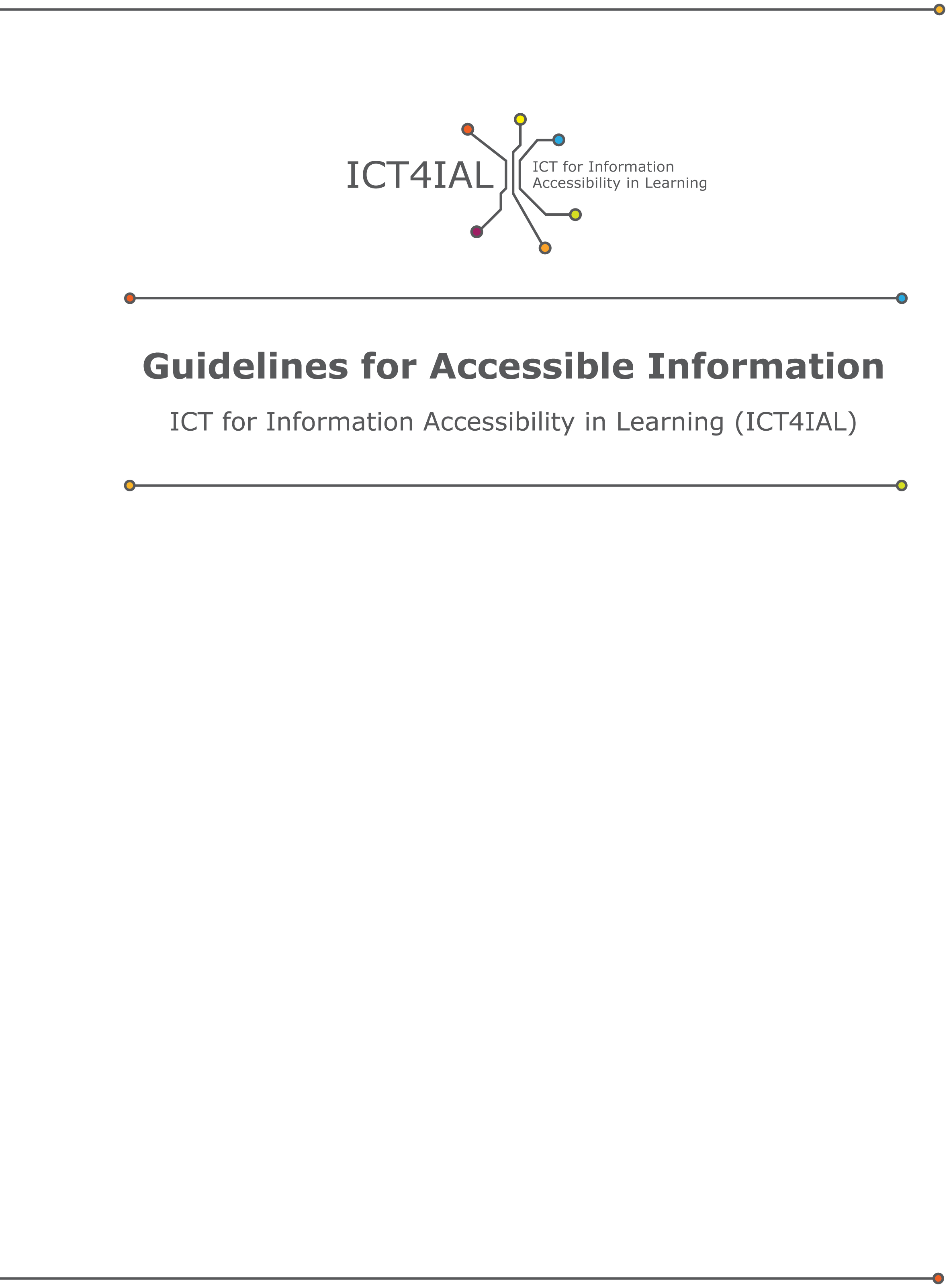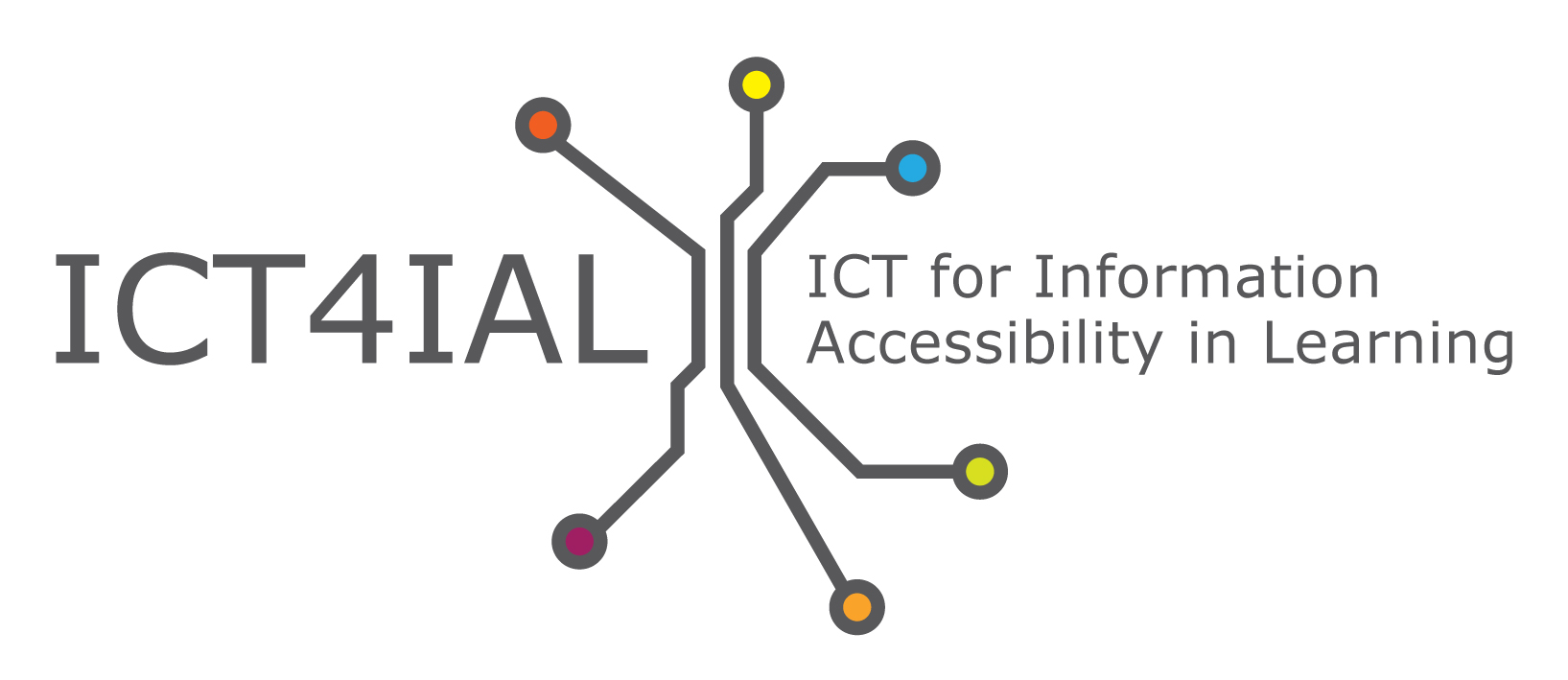Welcome to the ICT4IAL project area!
The ICT for Information Accessibility in Learning (ICT4IAL) project is a multi-disciplinary network of European and international partners that represent both learning and ICT communities. This network was co-funded by the European Commission under the Lifelong Learning Transversal Programme, Key Activity 3: Information and Communication Technologies.
Project activities began in January 2013 and ran until December 2015 and built on the results of the Agency’s Accessible Information Provision for Lifelong Learning project which aimed to foster accessibility of information in learning. The Agency acted as project co-ordinator in the ICT4IAL project.
Improving educational policy and practice for learners with special educational needs as well as improving the accessibility of ICT and information for learning is within the main interest of all ICT4IAL partners. This takes into account issues such as equal opportunities, accessibility and the promotion of quality of education, whilst recognising that there are differences in the countries’ policies, practices and educational contexts. Providing information on and for learning so it is accessible to all users is crucial, as non-compliance creates a barrier for learners with disabilities that compounds their special educational needs. Key information providers within lifelong learning need to act as role models in the field of accessibility and ensure that all information and resources shared are as accessible as possible for users with and without special needs.
Aims
The Agency together with European Schoolnet (EUN), the International Association of Universities (IAU), UNESCO, the DAISY Consortium and the Global Initiative of Inclusive ICTs (G3ICT) aimed to:
- Raise awareness and increase the visibility of the issue of accessible information provision and its relevance for equitable lifelong learning opportunities;
- Support accessible information provision within organisations through the development, trialling and evaluation of guidelines that build upon already existing work in the field.
To achieve the project aims, the ICT4IAL network worked towards a number of concrete objectives from which the partners and their member countries can benefit.
Project activities and outputs
Knowledge exchange and networking
The project activities revolved around exchange within the network and the involvement of the partner members’ country representatives during the project activities and especially in two major meetings.
The ICT4IAL network worked with experts in education and ICT from across Europe, as well as those working with key international organisations to exchange and collect multi-disciplinary knowledge with regard to accessibility of information for learning. Through this exchange, guidelines for organisations to improve their information accessibility have been developed.
Developing and Trialling of Practical Guidelines
A set of Guidelines for Accessible Information developed within the first year of project activities were trialled within the work of three organisations (the Agency, EUN, IAU), working across the compulsory and higher education sectors with the support and direct input of key advisory bodies for ICT (DAISY, G3ict and UNESCO).
Reflection and Evaluation upon Implementation
The process of the implementing the Guidelines was closely monitored and evaluated in order to identify learning points that are of use to other organisations considering future developments in this area of work.
Details of this implementation including the challenges and successful approaches to overcoming challenges within work processes were collected in a report to support organisations that aim to become more accessible, entitled Making Your Organisation's Information Accessible for All.
Validation of Guidelines
During the complete duration of developing, trialling and evaluation, the Guidelines were given feedback on and were validated by the European and international country network members of the Agency, EUN and IAU, but also the global membership of UNESCO. This process ensured the usability, applicability and adaptability to varying contexts of the Guidelines for Accessible Information developed to support organisations in providing accessible information. The Guidelines are also available on a separate project website as an online tool.
Dissemination and Exploitation of Results
Each ICT4IAL network partner is an established network. In addition to the ICT4IAL network sharing project information publicly, each organisation disseminated project outcomes and news within their respective networks and through their established channels.
All project outputs are shared in accessible formats. Special attention was given to making the project website as well as the actual project outputs a model of accessibility as well as offering outputs in up to 26 languages.
The ICT4IAL Dissemination and Exploitation report summarises all the activities carried out in order to disseminate key deliverables of the project.
The final Guidelines were launched as an open educational resource at an International Conference in Riga in 2015, which was an official event of the Latvian Presidency of the European Union. To ensure the sustainability of the Guidelines developed, they have been provided as an open educational resource via the project website in a total of 26 languages. As open educational resource, any user can freely access the Guidelines. They can share comments, additions or updates via the public website as well as adapt them to their own personal context under the Common License Agreement.
This will allow for the Guidelines:
- to be sustained beyond the project duration;
- to be updated as new technologies emerge;
- to be adapted to varying educational and geographic contexts.
All network partners are committed to sustain the project outcomes, especially the Guidelines for Accessible Information, beyond the project duration and will continue to advocate for the necessity of accessible information and the implementation of the Guidelines.
General information on the ICT4IAL project can also be downloaded as a flyer.


